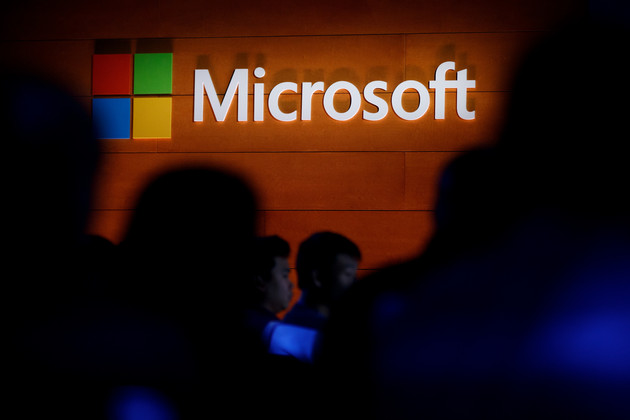There’s a new uncertainty about getting tech’s megadeals past skeptical regulators.

Microsoft’s president Brad Smith lambasted London for its overreach last month and lamented the U.K. was now closed for business. | Drew Angerer/Getty Images
Big Tech dealmakers should be worried. Regulators are coming for megamergers — and the United Kingdom’s veto of Microsoft’s blockbuster takeover is just the start.
“Everyone understands that a big tech deal is going to get significant scrutiny,” said Daniel Francis, a New York University law professor, and former senior Federal Trade Commission official. “And enforcers are more concerned right now about not bringing a case that they should have brought, than bringing a difficult case and losing.”
In multiple interviews with POLITICO over the last week, competition officials and policymakers painted a picture of antitrust regulators eager to flex their muscles when reviewing multibillion dollar acquisitions. Any perceived uncertainty, they added, was just a smoke-and-mirror show by companies accustomed to running roughshod over antitrust agencies worldwide.
For competition officials across the United States and Europe, many of whom were burned by failing to sufficiently scrutinize previous game-changing tech deals like Facebook’s $1 billion acquisition of Instagram more than a decade ago, the corporate world simply fails to accept a new reality that tougher enforcement is here, and it’s here to stay.
Repeatedly, FTC Chair Lina Khan has urged antitrust enforcers to intervene early in emerging technologies.
“[D]igital markets may be characterized by certain features that actually caution earlier action or greater action, particularly early to prevent markets from tipping and forming companies from locking in their market power in ways that can make competition much more difficult,” Khan said at an event in October.
New regulatory reality
London’s blocking of Microsoft’s $69 billion deal for the video-gaming giant Activision, according to company executives and those within the wider business community, marks a dark day when uncertainty from antitrust regulators, in how they approached such megadeals, undermined companies’ ability to do what they do best: make money.
However, in the view of many officials, the U.K.’s decision and a similar lawsuit filed by the FTC in December to challenge Microsoft’s largest-ever deal simply reflects a new shared understanding of how to address corporate concentration not just across the economy, but also in the fast-moving digital sector where new industries can flourish, almost overnight.
That is particularly true when it comes to tech deals where lawmakers, mostly in Europe, are rewriting their rulebooks to tackle the perceived over-concentration of market dominance online within the likes of Google, Apple, Facebook and Amazon. The companies take issue with that view.
Microsoft’s president, Brad Smith, lambasted London for its overreach last month and lamented that the U.K. was now closed for business. Microsoft’s lawyers had been optimistic — even in the hours building up to the ruling on April 26 — that the British regulator would greenlight the deal, according to two people with knowledge of the company’s thinking.
Microsoft declined to comment.
In repeated reviews of current antitrust practices, the European Union and U.K. have warned that existing Big Tech players — many of which already own vast swathes of the online economy — are gobbling up new parts of the digital landscape, often via acquisitions of nascent competitors that have yet to break into the mainstream.
Brussels’ revamp, known as the Digital Markets Act, came into force this month, and significantly restricts how certain so-called gatekeeping digital giants, or tech firms with an outsized footprint, can expand their businesses. London’s separate legislation, which also severely confines such wholesale dealmaking for such companies, is expected to be approved by the end of the year.
Similar bills were debated in the U.S. last year, but lawmakers failed to pass any of them.
International cooperation
Western regulators also bristle at criticism — most recently made by Microsoft — that competition authorities like the FTC, the European Commission and the U.K.’s Competition and Markets Authority are not working in tandem when ruling on which megadeals should be approved.
For most multibillion dollar acquisitions, companies typically need the OK from these agencies to ensure they won’t abuse their expanded positions in the market — approval that also extends to Chinese regulators when such deals include customers or business interests within the world’s second largest economy.
After the FTC and CMA ruled against Microsoft’s takeover of Activision, attention has now turned to Brussels where the EU’s officials have until May 22 to either block or approve the deal. Without backing from all three agencies — Microsoft is challenging the FTC’s lawsuit and has said it will appeal the British decision — the takeover will wither on the vine.
EU antitrust chief Margrethe Vestager said on Monday that she was prepared to come to “different conclusions” on deals, even citing different gaming tastes across the Atlantic.
“No pun intended, but shooter games are much more popular in the U.S.,” she told reporters at a Berlin press briefing. Football games are “much more popular in Europe, so there are differences in market shares.”
All agencies are working within their own domestic legal systems and take somewhat different approaches to how they operate, often given how local markets operate differently to those overseas. Yet despite their differences, antitrust officials note there’s now a broad consensus there’s too much concentration throughout the global economy.
What happened to Microsoft with its stalled Activision takeover could be repeated in a spate of pending deals. Those include Amazon’s purchase of iRobot, Broadcom’s acquisition of VMware and Adobe’s tie-up with Figma, all of which are under review in the U.S., U.K. and EU.
One official, who spoke on the condition of anonymity to speak freely about internal deliberations, said almost all Western regulators were now opposed to ongoing market concentration.
“How is that not certainty?” the person said.
Louis Westendarp contributed reporting.
- With this trick you can easily swallow medicine
- Unique Crypto Browser Offers Everyone the Opportunity to Mine with Ease
- High-Profile Indian Government Official Calls Bitcoin a Ponzi Scheme
- DAO IPCI: Platform for carbon markets, environmental assets and liabilities
- Crypto VC Firm Seeking $60M Amid Bitcoin Rout: Good Sign?





